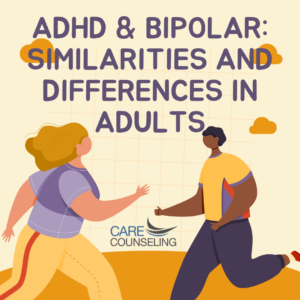At Vinland, we often see our clients who have TBI’s misdiagnosed as Bipolar Disorder, as the behaviors of both diagnoses can look very similar. That’s why education on one’s brain injury is so important for our clients struggling with substance use disorders. We liked this article from our friends at Care Counseling, & thought you might, too:
“Many mental health diagnoses such as Attention-Deficit/ Hyperactivity Disorder (ADHD) and Bipolar Disorder have features that are very similar, yet distinctly different. While it can be tempting to self-diagnose, it is important to seek support from a mental health professional, medical doctor, or psychiatrist to appropriate diagnosis and manage symptoms, utilizing interventions such as therapy and medication management.
Let’s take a further look at common manic symptoms found in bipolar disorder and notice how some of these may be also seen in individuals with ADHD.
Elevated or irritable mood
Increased energy and activity
More talkative than usual/ pressure to keep talking
Now let’s look at common symptoms associated with ADHD.
Attention-Deficit Hyperactivity Disorder
Hyperactivity-high energy level & restlessness
Impulsivity (e.g., with decision-making)
Need for immediate reinforcement
Difficulties delaying gratification
Often interrupting or intruding on others
Inattentive symptoms including distractibility
As you can see, both mania and hyperactivity involve changes in energy and activity levels. What about individuals impacted by additional mental health factors? According to the DSM-5-TR, it is common to have three or more co-occurring disorders with bipolar 1. The most associated disorders are as follows:
Other substance use disorders
Attention-deficit/ hyperactivity disorder (for bipolar 1)
Eating disorders (for bipolar 2)
Here are several differential features:
Onset: ADHD begins in childhood and at least some symptoms need to be present prior to age 12; whereas the typical onset of bipolar is in one’s 20’s.
Episodes: Those with bipolar will have distinct episodes of mania (characteristic of bipolar 1 disorder) or hypomania (characteristic of bipolar 2 disorder) which vary in the number of days that consecutive symptoms are present. In addition, there will also be distinct episodes of major depression present for those who are experiencing major depression. In ADHD, difficulties with attention/ concentration, increased energy, and impulsivity are persistent rather than episodic. Elevations in mood and grandiosity are not present in ADHD.
Therapeutic Interventions & Medication: Therapeutic interventions for ADHD include cognitive-behavioral and organizational/ time mgmt. strategies. Therapeutic interventions for bipolar also include cognitive behavioral therapy and may include a focus on emotional regulation, symptom management, and safety planning. Medications for ADHD often involve stimulants although there are also non-stimulant options; whereas medication for bipolar uses mood stabilizers.
If you are seeking support to help manage symptoms associated with bipolar, ADHD, or co-occurring mental health disorders, CARE Counseling is here to help.”
Written By: Charlotte Johnson, MA, LPCC


